Why gender matters - Centre for Social Responsibility in Mining ...
Why gender matters - Centre for Social Responsibility in Mining ...
Why gender matters - Centre for Social Responsibility in Mining ...
You also want an ePaper? Increase the reach of your titles
YUMPU automatically turns print PDFs into web optimized ePapers that Google loves.
How to – Monitor, evaluate and improve<br />
3.0 Monitor, evaluate and improve<br />
The more accurate and reliable the data upon which an <strong>in</strong>dicator is based,<br />
the better it will be as a measure of change – positive or negative. The<br />
accuracy of data is dependent on good engagement and consultation,<br />
a core pr<strong>in</strong>ciple of a <strong>gender</strong>ed approach.<br />
We have already discussed how<br />
<strong>in</strong>dicators should reflect or represent<br />
all the elements of a situation you<br />
wish to track <strong>in</strong> order to design<br />
and implement programmes that<br />
lead to better <strong>gender</strong> and diversity<br />
outcomes.<br />
Until a programme has been fully<br />
implemented and run its course, it<br />
will be impossible to evaluate how<br />
well it achieved its objectives and<br />
what the impacts have been, positive<br />
or negative. Monitor<strong>in</strong>g, however,<br />
should be an ongo<strong>in</strong>g process.<br />
A <strong>gender</strong>-sensitive monitor<strong>in</strong>g<br />
framework should be outl<strong>in</strong>ed <strong>in</strong><br />
the multi-year communities plans.<br />
Ongo<strong>in</strong>g monitor<strong>in</strong>g allows us to<br />
see the successes or shortcom<strong>in</strong>gs of<br />
our programmes as they progress,<br />
which provides a basis <strong>for</strong> mak<strong>in</strong>g<br />
adjustments and improvements,<br />
along the way. Evaluation should<br />
take place once the work has<br />
been completed and will measure<br />
the outcomes and impacts of the<br />
programme or activity.<br />
Monitor<strong>in</strong>g and evaluation of <strong>gender</strong><br />
sensitive data, as part of regular<br />
evaluation processes, is essential<br />
<strong>in</strong> order to:<br />
– ensure that programmes and<br />
projects promote <strong>gender</strong> equality;<br />
– ensure that any adverse impacts<br />
are not disproportionately fall<strong>in</strong>g<br />
on either men or women;<br />
– enable better policy and plann<strong>in</strong>g;<br />
and<br />
– measure progress aga<strong>in</strong>st<br />
commitments to <strong>gender</strong>.<br />
Ideally, monitor<strong>in</strong>g and evaluation<br />
would <strong>in</strong>volve women and men<br />
as full participants, not just as<br />
providers of data and <strong>in</strong><strong>for</strong>mation<br />
as this will result <strong>in</strong> a better<br />
understand<strong>in</strong>g of who <strong>in</strong> the<br />
community has benefited from<br />
m<strong>in</strong><strong>in</strong>g development and who<br />
has borne the highest cost (UNDP<br />
2006). A monitor<strong>in</strong>g process that<br />
<strong>in</strong>volves stakeholders, <strong>for</strong> example,<br />
<strong>in</strong> develop<strong>in</strong>g <strong>in</strong>dicators and<br />
collect<strong>in</strong>g data, can help ensure that<br />
monitor<strong>in</strong>g becomes a co-managed<br />
process rather than a process driven<br />
solely by the m<strong>in</strong><strong>in</strong>g operation.<br />
Checklist<br />
[ √ ] Does the monitor<strong>in</strong>g framework<br />
<strong>in</strong>clude <strong>gender</strong> sensitive<br />
<strong>in</strong>dicators?<br />
[ √ ] Are these <strong>in</strong>dicators<br />
underp<strong>in</strong>ned by credible data<br />
and are they updated regularly?<br />
[ √ ] Is monitor<strong>in</strong>g tak<strong>in</strong>g place <strong>in</strong> a<br />
planned way and on a regular<br />
basis?<br />
[ √ ] Are changes/adjustments be<strong>in</strong>g<br />
made to programmes as a result<br />
of monitor<strong>in</strong>g?<br />
[ √ ] Are monitor<strong>in</strong>g and evaluation<br />
processes participatory wherever<br />
possible, and <strong>in</strong>clusive of both<br />
women and men?<br />
3.1 Cont<strong>in</strong>ual improvement<br />
70<br />
Monitor<strong>in</strong>g, evaluation, audit and<br />
assessment should raise awareness<br />
about the size and scale of the<br />
<strong>gender</strong> gap and the extent to<br />
which an activity has addressed<br />
the different needs, aspirations,<br />
resources and constra<strong>in</strong>ts of women<br />
and men. This <strong>in</strong><strong>for</strong>mation should<br />
<strong>in</strong><strong>for</strong>m project and programme<br />
implementation and identify<br />
opportunities <strong>for</strong> improvement<br />
<strong>for</strong> new and exist<strong>in</strong>g projects,<br />
at all stages of m<strong>in</strong>e life.<br />
Other opportunities through which<br />
we can monitor and evaluate<br />
<strong>gender</strong> at the local level <strong>in</strong>clude:<br />
– site managed assessments;<br />
– communities diagnostic; and<br />
– technical evaluation group<br />
reviews.<br />
Monitor<strong>in</strong>g is the ongo<strong>in</strong>g<br />
measurement of progress aga<strong>in</strong>st<br />
<strong>gender</strong> <strong>in</strong>dicators us<strong>in</strong>g accurate<br />
and reliable <strong>in</strong><strong>for</strong>mation.<br />
Evaluation is the assessment<br />
of overall and end achievements<br />
and results. It centres mostly on<br />
outcomes and impacts.


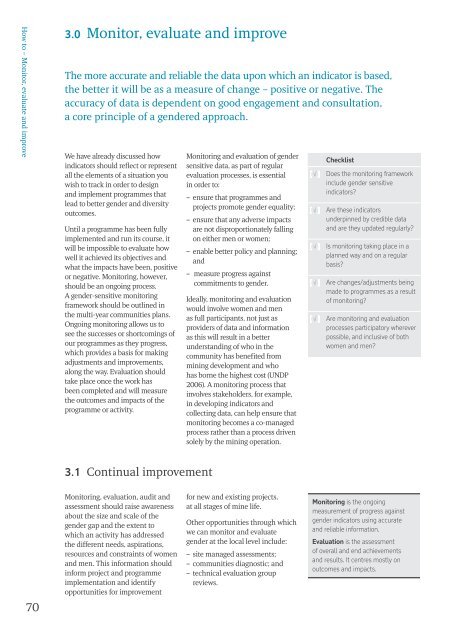

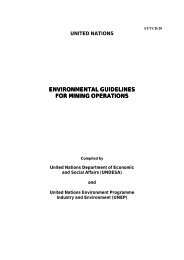

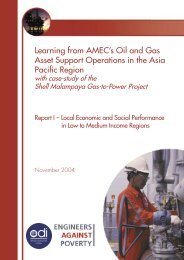

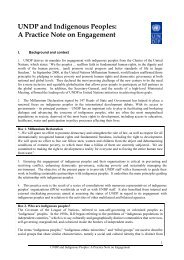
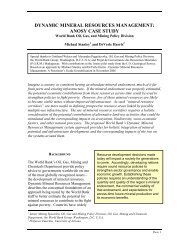


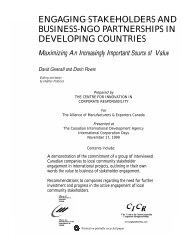


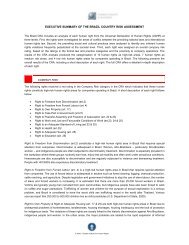
![[PDF] Community Development Toolkit - CommDev](https://img.yumpu.com/48616495/1/184x260/pdf-community-development-toolkit-commdev.jpg?quality=85)
